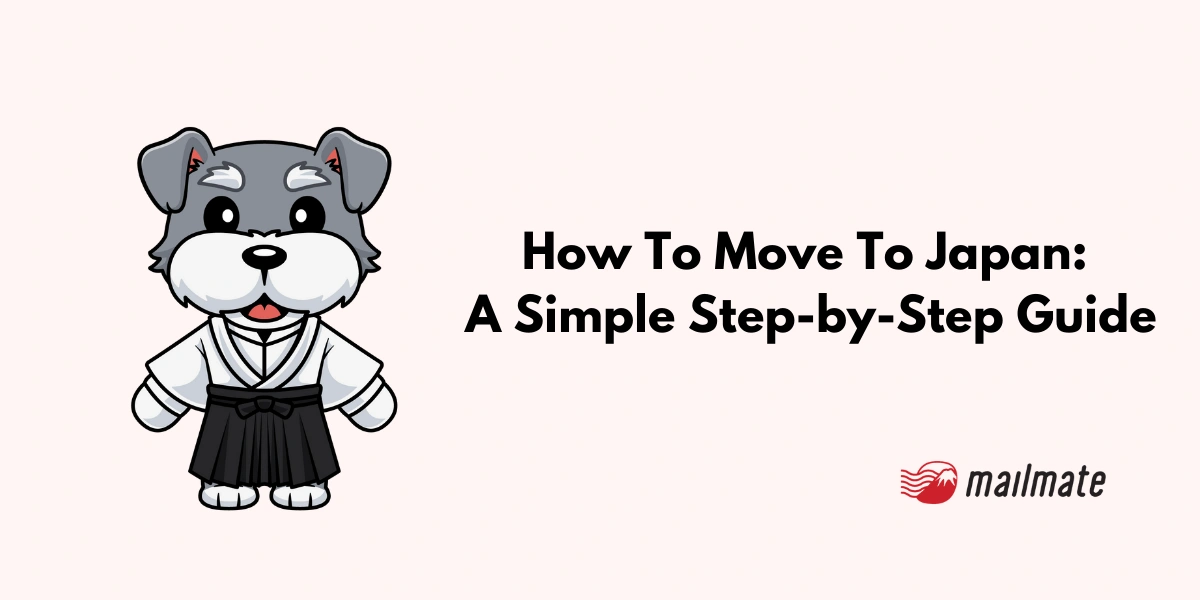How To Move To Japan: A Simple Step-by-Step Guide

Moving to another country is a huge life change, and Japan is no different.
While moving to Japan isn't the easiest, it's certainly not the hardest. It requires a lot of prep work from Japan and in your home country.
Whether you are considering moving to Japan permanently or temporarily, this how to move to Japan guide will help you.
Step 1: Finding the right visa
Getting your visa into Japan is the hardest part, as you'll need someone from Japan to sponsor your visa.

The visa you get on your passport acts as an entry visa, and it'll help you enter the country. The Ministry of Foreign Affairs of Japan (MOFA) is responsible for setting up visa policies and issuing visas through Japanese embassies and consulates abroad.
The most common long-term Japanese visas people get are:
Highly skilled professional visa
Work visa
Spouse Visa: when married to a Japanese citizen or Japanese national so you can live in Japan.
Student visa: applies to anyone attending a Japanese university or Japanese language school.
Unfortunately, you can not move to Japan on a tourist visa.
Once you know which visa best suits your situation, you'll need to prepare the supporting documents, Certificate of Eligibility (COE), and the visa application form to your nearest Japanese Embassy or Consultant.
Step 2. Finding accommodation
Finding a place to live while aboard is a hassle due to time zone differences.
Many foreigners will live in any provided housing from their university or language school as it's the easiest. Depending on the Japanese companies, they can also provide housing to their employees.
Additionally, many long-term foreign residents will opt for shared houses where you'll share spaces such as bathrooms and the kitchen.
Once you are fully settled in Japan, you can get your own apartment or an akiya house if you desire.
Step 3: Preparing for the move
Moving to Japan is more than just all paperwork. It's important to bring any belongings and other essentials.
When packing your items, clothes will be the number one. So check Japan's local weather as it varies throughout its region. For example, Hokkaido is known to have harsher winters than Fukuoka.
See if you need a voltage and outlet converter for any important electronics you bring.
Additionally, you should have these items with you on your person at all times when you are on your way to Japan:
Passport
Visa and Certificate of Eligibility (COE)
Translated documents
Since you will live in Japan for over 6 months, you will sign up for Japan's National Health Insurance at your local ward office. So, you do not need international or traveler insurance.
Step 4. Managing your finances
Moving to another country is already expensive, and the cost of living in Japan will affect the way you manage your finances.
Looking up the cost of living in your area allows you to anticipate items such as:
Rent and utilities
Healthcare: in general, you'll only pay 30% of the cost.
Groceries
Dining out
Transportation
Hobbies
Taxes: residence taxes and contributing to the National Pension, though your employer will handle the calculations.
So, the first thing to do is open a Japanese bank account to receive your salary, pay rent and utilities, and manage other daily living costs. You'll also need to set up a phone plan to get a Japanese phone number.
Step 5. Navigating city offices
After arriving in Japan, you need to register your residence at your local Japanese government office within 14 days after you land. Bring your passport and residence card.
Additionally, you can do these processes at the local government office
Get a Japanese Health Insurance card if you are eligible to receive one
Register your children for school
National Pension (Kokumin Nenkin) Enrollment
Receive My Number Card
Registering your child(ren) at the available Japanese schools
Applying for Child Allowance for children under 15
Tips after moving to Japan
Know any tax obligations you might have.
After moving to Japan, you might have tax obligations in your home country. If you are an American citizen, the U.S. still requires you to file taxes on your global income.
The U.S. and Japan do have tax treaties to prevent double taxation, but you still need to file the necessary forms:
Form 1040: Your regular tax return to the IRS
Form 2555: For a foreign-earned income
Form 1116: For foreign tax credits
FBAR: If you have more than $10,000 in a foreign bank account at any time during the year, you must report it
For more complex tax needs, such as owning property or running a business in Japan, it's best to consult a tax professional familiar with U.S. and Japanese tax laws.
Embrace Japanese culture.
Living in Japan may be different from living in your home country.
So, keep some of these important aspects in mind:
Respect for rules, such as sorting trash correctly and being quiet in public places.
Gift giving: called "omiyage," and these are small gifts to friends, family, and coworkers.
Potentially get permanent residency.

Permanent resident card example from MOJ
Obtaining permanent residency in Japan is an option for long-term residents, which allows you to stay in Japan indefinitely and work in any field without visa restrictions.
In general, you can qualify for P.R. by living in Japan for:
10 years on a work visa or longer-term visa.
1-5 years for spouses of Japanese nationals or permanent residents.
1 year for those holding a Highly Skilled Professional visa.
Note: You need to maintain legal residence in Japan, so you might need to apply for a re-entry permit if needed.
Frequently asked questions
Can a U.S. citizen move to Japan?
Many U.S. citizens have been able to move to Japan. You"'ll need to apply for a visa that best suits your situation at your local Japanese Consulate or Embassy. After moving to Japan, you'll need to fulfill your tax obligations.
How difficult is it to move to Japan?
Japan isn't the hardest country to move to but is also not the easiest. Before taking the steps, you should research and prepare first.
Can I move to Japan without a job?
A working or highly skilled professional visa is the most common visa for those getting a job in Japan. If that is not the case, you'll need to consider other types of visas for your situation. For example, you can obtain a start-up or business manager visa to start a business in Japan.
In closing
Knowing how to move to Japan will prepare you for a big life decision. Whatever your reason may be, it's always best to be prepared to know the specific documents and steps you need to take.
Spending too long figuring out your Japanese mail?
Virtual mail + translation services start at 3800 per month. 30-day money-back guarantee.

